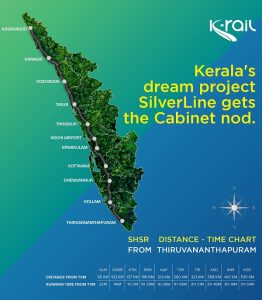
In Rajya Sabha, Kerala MPs spar over disputed SilverLine project

A demand was made in the Rajya Sabha on Thursday that the Centre should expeditiously give its nod to a proposed nearly ₹64,000-crore high-speed rail line connecting two ends of Kerala.
Raising the issue during Zero Hour, Elamaram Kareem of the CPI (M) said that the Kerala government has proposed 530-km rail corridor from Thiruvananthapuram to Kasaragod, called the SilverLine corridor.
Also read: Why Pinarayi govt’s ambitious SilverLine project is facing hurdles?
Kareem said that the double line project would connect both ends of Kerala in four hours, as against the present duration of 10-12 hours. Trains can run with a maximum operational speed of 200 kmph, carrying around 80,000 passengers per day.

“A feasibility study of the project was conducted in 2019 and Railway Board has issued in-principle approval for the project on December 17, 2019,” Kareem said.
“SilverLine is green transportation and will be reducing 2.8 lakh tonnes of carbon dioxide emissions per day. It will create 15,000 direct and indirect employment during construction days and 11,000 direct and indirect employment during the operational phase. I request the government to give permission immediately,” Kareem said.
However, KC Venugopal of the Congress said, “Without environment clearance, the government of Kerala is bulldozing the project. Entire people of Kerala are against this.”
As the two members sparred, Rajya Sabha Chairman M. Venkaiah Naidu said that there should be no controversy in the House.
“Let the government study this proposal in all pros and cons and then take a view,” Naidu said.
Also read: Protesters in Kerala remove SilverLine project survey stones
A demand for an OBC census was also made in the House by B Lingaiah Yadav (TRS), while M Shanmugam (DMK) sought a higher gratuity limit of ₹20 lakh to be provided to those employees, who retired in the intervening 27 months, when the 7th Central Pay Commission doubled the ceiling to ₹20 lakh from January 1, 2016, and the modification of the Gratituty Act on March 20, 2018.
Rakesh Sinha (Nominated) raised the issue of non-development of the Kabar Lake, a wetland of international importance, located 22-km northwest of Beguarai town in Bihar.
“The lake, which was in 2000 declared Bihar’s first Ramsar site, hosts 106 species of resident birds and is a nesting ground for 59 species of migratory birds,” Sinha said.
Sasmit Patra of the BJD raised the issue of non-opening of Awas Portal for Odisha, which could have added six lakh Pradhan Mantri Awas Yojana houses for the tribals in the state.
“This, despite the state Chief Minister writing to the central government three times in as three years,” Patra said, demanding opening up of the portal as was done in the case of Karnataka where 25 lakh houses got added.
His party colleague Amar Patnaik said that “step-motherly” treatment was being meted out to Odisha by denying the addition of 6.65 lakh houses for the tribal population.
Sujeet Kumar (BJD) said that the Centre should show a non-partisan attitude and do the same for Odisha.
Shaktisinh Gohil (Congress) demanded the inclusion of Kutchi, an Indo-Aryan language spoken in the Kutch region of Gujarat, in the 8th Schedule of the Constitution.
Santanu Sen (TMC) said that a part of Jammu and Kashmir has been demarcated in a different colour than the rest of India on a map hosted by the WHO’s COVID website.
“Our government should have been more vigilant on this particular issue,” Sen said.
Also read: Takeaways from Sitharaman’s speech: Key proposals
Jose K Mani (Kerala Congress) demanded that rubber and spices should be given agriculture produce status and a mechanism be set up to declare minimum support price every two years while Subhash Chandra Singh (BJD) sought a reduction in GST on tendu leaf collection.
Vikas Mahatme (BJP) wanted tax collected on the sale of “sin goods” like alcohol and tobacco to be used for creating public awareness against the use of such products and to treat addicts.
(With inputs from Agencies)

